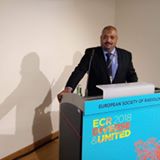Abstract
Objective
To regulate the safety, efficacy, complications, and prognostic factors for survival related to the utilize of expandable radiofrequency (RF) electrodes in the treatment of centrally placed hepatocellular carcinoma (HCC).
Patients & methods
Eighty-six patients with centrally placed single HCC (≤5 cm) undergo RF ablationusing expandable electrode. Therapeutic safety and efficacy were evaluated. Logistic regression analyses of risk factors for complication and multivariate cox-regression analyses for overall survival were recorded.
Results
No procedure -related major complications or death occurred. Primary and secondary complete ablation rate was 83.7% & 100%, respectively. We observed a strong association between, gender (P = 0.003) and etiology of cirrhosis (P = 0.02) and complications. Overall-survival rate after 25 months follow-up period was 74% and recurrence-free survival was 88.4%. No significant risk factor relationship for overall-survival could be detected.
Conclusion
The use of the expandable electrode in the treatment of centrally placed HCC tumors by RF ablation is safe and effective. Careful patient selection and the best approach choice (accurate placement and appropriate deployment) will get better the outcome.

